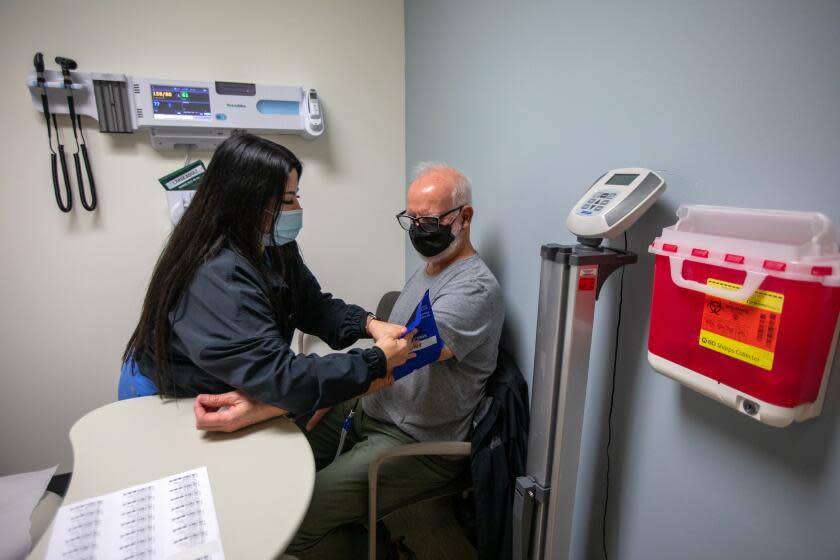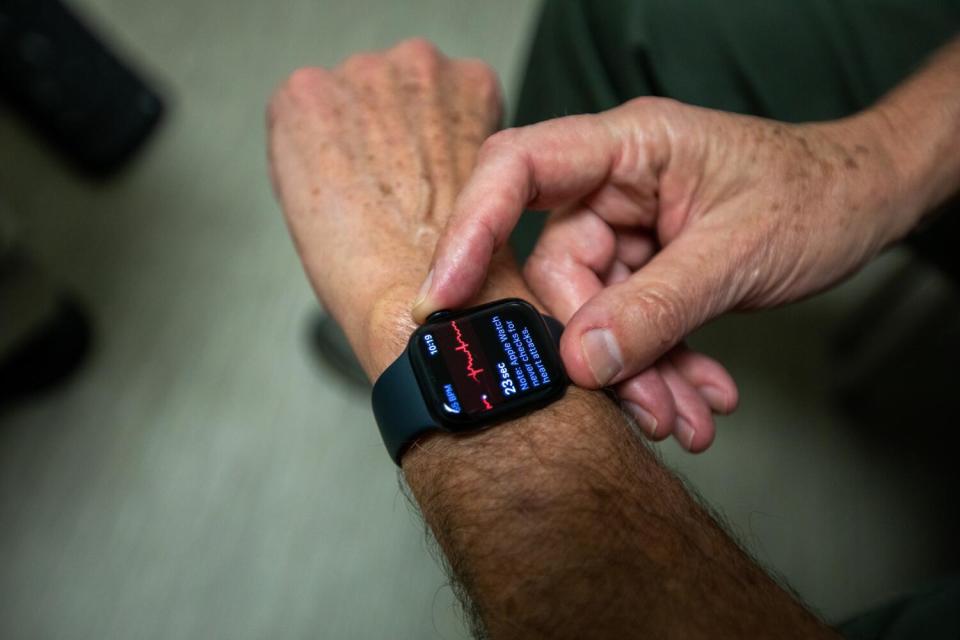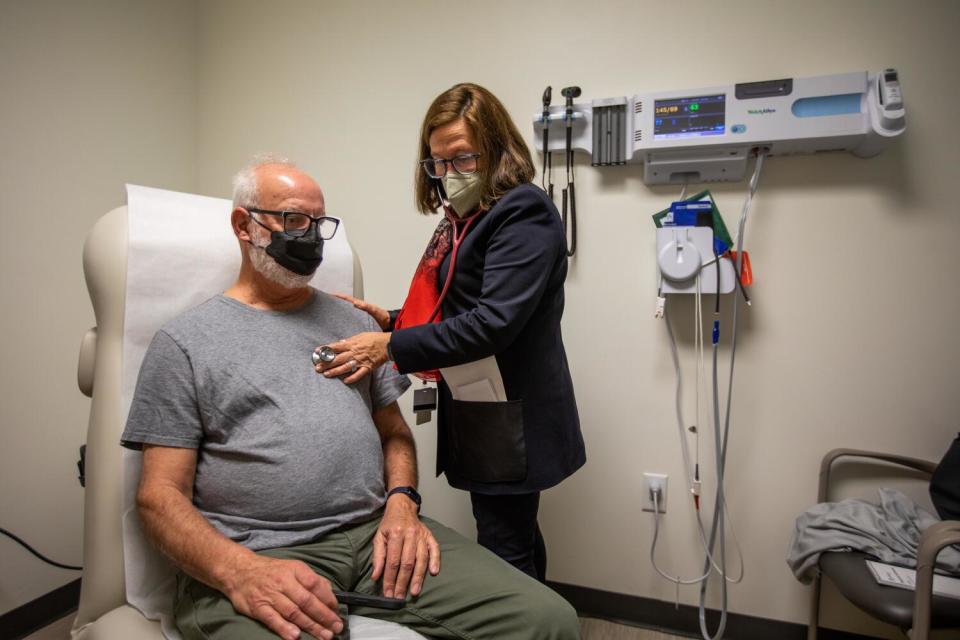Column: 'An apple a day keeps the doctor away' is a big fat lie

- Oops!Something went wrong.Please try again later.
I went to my dentist earlier this year for a regular checkup, and he made a series of observations nobody wants to hear.
I had a cavity.
It was under a crown.
And the crown was next to a wisdom tooth that might have to be yanked to make room for him to saw off the crown and fix the cavity.
So I went to see an oral surgeon, who had his own set of progressively worse observations.
Yes, the wisdom tooth would have to come out.
But an X-ray showed another cavity under another crown.
And the second cavity was worse than the first, and deep enough that I might need that tooth yanked out of my head as well.
OK, swell. But my pacemaker battery was running low, and what if it conked out in the middle of an extraction?
Read more: Column: Is 75 the right age to wait for death? Steve Lopez isn’t quite ready to pack it in
It's not as if I haven't tried to stay on top of things — I walk, swim, ride a bike, brush and floss and eat reasonably, at least some of the time. But whoever said an apple a day keeps the doctor away was lying.
“It’s all about managing decline,” my friend Kenny says.
Managing decline is time-consuming. Medicare patients 65 and older (I’m 70, but not using Medicare yet) have roughly 20 visits each year to a doctor’s office or medical facility — and that doesn't include dental care — according to a recent study published in the Annals of Internal Medicine. The researchers said better coordination among healthcare providers for exams, lab work, imaging, etc., could ease that burden, and so could greater reliance on telemedicine.
“I joke with people that my whole goal in life is to spend more time with friends and family than I do with doctors,” said retired photo editor Bob Carey, 77, a former colleague who reached out to me as I was sorting through my various dental and coronary issues.
Carey had been in and out of emergency rooms and testing labs and talking to medical officials for 18 months, with heart issues, swallowing problems, a hernia and assorted other joys of elderhood.

When you get to where one thing after another is breaking down, and you’re referred to one specialist after another, retired geriatrician Michael Wasserman says you run a risk that he saw all too frequently in his practice:
“Too many older adults are on too many medications,” he said, and they’re not necessarily in better health because of it.
“You end up with patients who see several doctors, who ultimately put them on multiple medications,” Wasserman said. “Often, these medications are being used to treat side effects of previously prescribed medications. This is called a ‘prescribing cascade.’ ”
In my own cascade of dental and coronary adventures, I decided that before scheduling my extractions, I should tell the oral surgeon I was due for a pacemaker replacement. And the reason I have a pacemaker is that 11 years ago, as the anesthesia was wearing off after the first of two knee replacement surgeries, I went into cardiac arrest, flat-lined and was resuscitated. Would sedation for the extractions trigger a similar reaction?
The oral surgeon, contemplating the risk of having to explain how he lost a patient during a dental procedure, suggested I take care of the heart issue first. That made sense, but the heart surgeon wasn’t available for several weeks, and the oral surgeon was about to discontinue accepting my dental insurance, because that’s the way things work in American healthcare, do they not?
Read more: Time to retire? Absolutely, said some. Never, said others. After a year of research, I had my answer
This is why there’s wine and bourbon. You know you shouldn’t indulge too much, especially as you get older, but that’s when you need it most.
The crisis was averted when my cardiologist determined I could safely take care of the teeth before getting the new pacemaker. So I went with that plan, got the teeth pulled without a hitch, and was amazed at how much food gets stuck in the holes in your gums. I could have dug an entire box of Cheez-Its out of each one.
Unfortunately, when a pacemaker battery fades, you can’t just go to the drug store for a Double A battery. The whole pacemaker comes out and a new one goes in — it’s roughly a half-day procedure. In the operating room, before they began sedating me, I heard the surgeon enter the room, take a look at the pacemaker, and pronounce that it was the wrong model. So they had to call the pacemaker sales rep, who was not at the hospital, and tell him to bring the right one ASAP.
I found it a bit unsettling that someone ordered the wrong device, and that the right one might be in the vehicle of somebody who was now speeding toward the hospital. Is this how it’s ordinarily done? The sales rep finally showed up with the goods, the surgery proceeded, and I was back home in time for lunch, good for another 50,000 miles or so, depending.
As I dealt with all of this, my wife was juggling her own medical matters, scheduling conflicts, billing fiascoes, insurance madness and whatnot — the usual, in other words — and came home from a doctor visit one day with a story to tell.

You know how you go to a doctor's office and they hand you the same forms to fill out every time, and you’ve got to answer questions about your name, age, address, insurance, symptoms and history, even if you just filled out the same forms yesterday, last week, and 10 times in the last month?
At her appointment, my wife said, another patient was handed an electronic tablet and told to go through the form. The woman initially complied, then thought better of it, and marched back to the counter and said, as my wife recalls:
"I’ve done this. I’m not going to do it again. It doesn’t mean anything. I’m not doing it.”
And the person at the counter said fine.
This is a triumph, in my humble opinion. It was a breakthrough moment in American healthcare history, and that woman is a hero.
Don’t get me wrong. I’m lucky to be relatively healthy, and to have access to good doctors. But managing your own health, which can be a full-time job, spikes your blood pressure. You become a general contractor, goat herder, traffic cop, negotiator and beggar in a byzantine system that would be so much better — for doctors and patients — if it were more about the mission of healthcare than the business of it.
Soon enough, my bill for the pacemaker transplant arrived by mail.
The total was $68,000 — because, once again, this is the American healthcare system — and it said at the top:
“This is not a bill.”
I suppose that's because the insurance company hadn’t weighed in yet, so why bother sending me the tally at all? I’m thinking of sending a check and writing at the top:
“This is not a payment.”
I think Bob Carey, an avid kayaker, has the right attitude about it all.
“I’m 77 [and] in good enough shape that I can paddle for three hours,” he said. “I’m lucky I didn’t die of a heart attack in 2012, survived major open heart surgery in 2017, got a hip replacement and a hernia repair in 2023, and I’m back paddling, gardening and working out. As much as going to doctors is a pain … it beats dying.”
steve.lopez@latimes.com
This story originally appeared in Los Angeles Times.

